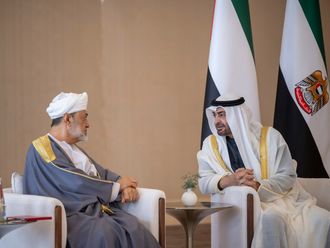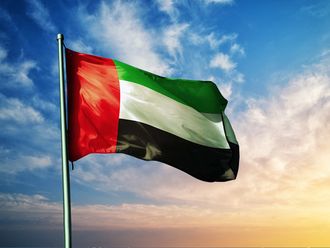Abu Dhabi: Helping employ Afghan women and providing them with an opportunity to better their lives, the Fatima Bint Mohammad Bin Zayed Initiative (FBMI) offers a unique and creative approach by employing Afghan women in the handmade carpet industry.
The initiative comes with several benefits for the women who are hired, as it not only provides them with a source of income, but also grants employees and their families free health care, as well as access to education, among several other benefits. While mainly employing women, the programme also extends assistance to men, with 30 per cent of hired employees being men.
Gulf News spoke with Maywand Jabarkhyl, the Executive Director of FBMI, who detailed how the programme works and the benefits it provides. “The Fatima Bint Mohammad Initiative is a community development project in Afghanistan. Formed by Her Highness in 2010 to empower Afghan women, the initiative takes a unique approach to grassroots development by employing men and women in the handmade carpet industry whilst offering all employees access to free health care, education, counselling as well as adult vocational training to develop capacity among staff.
The reason why the initiative is now self-sufficient and, most importantly, sustainable is that there is an element of private sector entrepreneurship involved, in that the carpets are then sold worldwide, ensuring the money is ploughed back into the expansion of the project.”
Since its inception, the FBMI has swelled the number of people it employs, with over 4,000 currently employed by the initiative, according to Maywand. “In 2010, we began the initiative employing 1,800 men and women across three Afghan provinces. Today we now have over 4,000 employees, 70 per cent of whom are women, of which half are widows and the sole breadwinners in their families. This employment is spread across 11 Afghan provinces. We are an equal opportunities employer.”
Before becoming an employee of the organisation, a social contract is made between both parties, and must be strictly enforced says Maywand, ensuring fair wages, free health care, free education, and other workers rights to make sure the entire process is completely humane and ethical.
Explaining the contract, Maywand says. “For anybody who wants to become an FBMI employee, we have one condition, which we enforce very strongly: that the employee must sign a social contract with us whereby they are able to avail free health care, free education for their children as well as fair market wages, free counselling and a range of other benefits including capacity development. Ultimately, we ensure that our carpets are ethically woven.
“We enforce these through our departments. The health department is responsible for the health of the employee and, in particular, the health of pregnant women. Similarly our education department is in direct contact with schools to ensure children attend school and are progressing well. Our third department is the women’s affairs department who work as tirelessly as the other departments to ensure the well-being of the employees as well as provide counselling,” she added.
Thanks to the organisation’s work, Afghan carpet prices have seen an appreciation in their value, allowing the FBMI to invest those revenues back into the organisation. “As a result of the FBMI, the price of Afghan carpets worldwide have risen 30 per cent since 2010 to levels that can now ensure an appropriate percentage can be given back to the weavers. FBMI have also constructed two centres in Kabul and Jalalabad where the carpets can be exported directly from Afghanistan via air. These centres also house the Educational and medical facilities responsible for looking after the welfare of our employees,” says Maywand.
The carpets themselves have also been featured prominently, according to Mawand, being provided as gifts to leaders such as US President Barack Obama, and former French president Nicolas Sarkozy.
“FBMI is a project the UAE are very proud of. His Highness Shaikh Abdullah Bin Zayed [Al Nahyan], the Foreign Minister, gives our carpets as gifts on his diplomatic travels; such is the important of the project and the beauty of the work we are doing. Recipients include Barack Obama and Nicolas Sarkozy to name a few. The carpets are also used to furnish UAE Embassies worldwide including Washington, London, Brussels, and Beirut to name a few. FBMI carpets also sit well at the Presidential Palace in Kabul. From a commercial point of view, we also have tie-ups with companies such as Bloomingdales and work with design firms to use the carpets at hotels such as Madinat Jumeirah’s Minaa Salam as one example,” she says.
The biggest success though of the project is that it has made people’s lives better as well as empowering women in the country, which has further wide-ranging benefits, says Maywand. “The most tangible success however is both in the outcome of the product as well as the stability of the employees’ lives. By outcome, I mean the women are now weaving new designs, news techniques and new qualities that are more marketable and sell. Simultaneously, we have witnessed a great improvement in their levels of happiness, social welfare and primarily, their health. This goes to show that happier and healthier communities can produce better art.
“When women are involved, the benefits spread wider. It impacts the children, neighbours and the entire community. We have witnessed this first hand whereby our weavers invite their neighbours to work on the carpet loom with them, thus becoming a community effort. We work to empower women and allow them the basic fundamental of regaining control of their lives once again. By being able to provide for their families, they are able to do so. Our message to the women of Afghanistan and particularly the widows is simple: you are not forgotten, nor are you alone,” she adds.
— Sami Zaatar is a trainee at Gulf News










